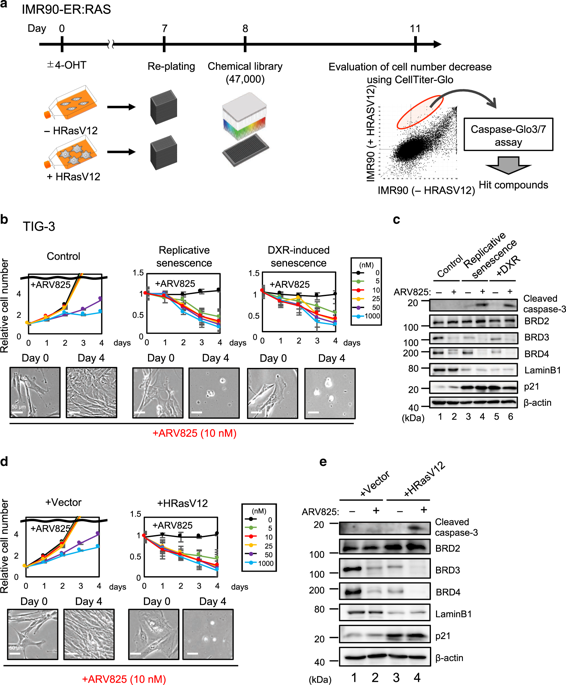当前位置:
X-MOL 学术
›
Nat. Commun.
›
论文详情
Our official English website, www.x-mol.net, welcomes your
feedback! (Note: you will need to create a separate account there.)
A BET family protein degrader provokes senolysis by targeting NHEJ and autophagy in senescent cells.
Nature Communications ( IF 14.7 ) Pub Date : 2020-04-22 , DOI: 10.1038/s41467-020-15719-6 Masahiro Wakita 1 , Akiko Takahashi 2 , Osamu Sano 3 , Tze Mun Loo 2 , Yoshinori Imai 2 , Megumi Narukawa 1 , Hidehisa Iwata 3 , Tatsuyuki Matsudaira 1, 4 , Shimpei Kawamoto 1 , Naoko Ohtani 5 , Tamotsu Yoshimori 6 , Eiji Hara 1, 2, 4
Nature Communications ( IF 14.7 ) Pub Date : 2020-04-22 , DOI: 10.1038/s41467-020-15719-6 Masahiro Wakita 1 , Akiko Takahashi 2 , Osamu Sano 3 , Tze Mun Loo 2 , Yoshinori Imai 2 , Megumi Narukawa 1 , Hidehisa Iwata 3 , Tatsuyuki Matsudaira 1, 4 , Shimpei Kawamoto 1 , Naoko Ohtani 5 , Tamotsu Yoshimori 6 , Eiji Hara 1, 2, 4
Affiliation

|
Although cellular senescence acts primarily as a tumour suppression mechanism, the accumulation of senescent cells in vivo eventually exerts deleterious side effects through inflammatory/tumour-promoting factor secretion. Thus, the development of new drugs that cause the specific elimination of senescent cells, termed senolysis, is anticipated. Here, by an unbiased high-throughput screening of chemical compounds and a bio-functional analysis, we identify BET family protein degrader (BETd) as a promising senolytic drug. BETd provokes senolysis through two independent but integrated pathways; the attenuation of non-homologous end joining (NHEJ), and the up-regulation of autophagic gene expression. BETd treatment eliminates senescent hepatic stellate cells in obese mouse livers, accompanied by the reduction of liver cancer development. Furthermore, the elimination of chemotherapy-induced senescent cells by BETd increases the efficacy of chemotherapy against xenograft tumours in immunocompromised mice. These results reveal the vulnerability of senescent cells and open up possibilities for its control.
中文翻译:

BET家族蛋白降解剂通过靶向NHEJ和衰老细胞中的自噬而引起衰老。
尽管细胞衰老主要是作为一种肿瘤抑制机制,但体内衰老细胞的积累最终会通过炎症/肿瘤促进因子的分泌而产生有害的副作用。因此,期望开发出导致衰老细胞特异性消除的新药物,称为衰老。在这里,通过对化合物的无偏高通量筛选和生物功能分析,我们确定BET家族蛋白降解剂(BETd)是一种有前途的镇静药物。BETd通过两个独立但整合的途径引发衰老。非同源末端连接(NHEJ)的减弱,以及自噬基因表达的上调。BETd处理可消除肥胖小鼠肝脏中衰老的肝星状细胞,并减少肝癌的发生。此外,通过BETd消除化学疗法诱导的衰老细胞,可提高化学疗法针对免疫受损小鼠中异种移植肿瘤的功效。这些结果揭示了衰老细胞的脆弱性并为其控制打开了可能性。
更新日期:2020-04-24
中文翻译:

BET家族蛋白降解剂通过靶向NHEJ和衰老细胞中的自噬而引起衰老。
尽管细胞衰老主要是作为一种肿瘤抑制机制,但体内衰老细胞的积累最终会通过炎症/肿瘤促进因子的分泌而产生有害的副作用。因此,期望开发出导致衰老细胞特异性消除的新药物,称为衰老。在这里,通过对化合物的无偏高通量筛选和生物功能分析,我们确定BET家族蛋白降解剂(BETd)是一种有前途的镇静药物。BETd通过两个独立但整合的途径引发衰老。非同源末端连接(NHEJ)的减弱,以及自噬基因表达的上调。BETd处理可消除肥胖小鼠肝脏中衰老的肝星状细胞,并减少肝癌的发生。此外,通过BETd消除化学疗法诱导的衰老细胞,可提高化学疗法针对免疫受损小鼠中异种移植肿瘤的功效。这些结果揭示了衰老细胞的脆弱性并为其控制打开了可能性。































 京公网安备 11010802027423号
京公网安备 11010802027423号